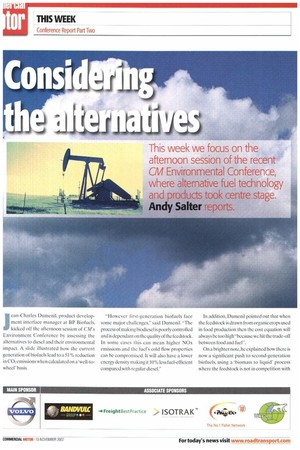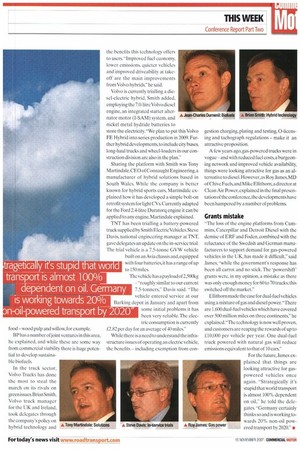This week we focus on the afternoon session of the
Page 30

Page 31

If you've noticed an error in this article please click here to report it so we can fix it.
recent CM Environmental Conference, where alternative fuel technology and products took centre sta*e.
Andy Salter reports
jilean-Charles Dumenil, product development interface manager at BP Biofuels, kicked off the afternoon session of GM's Environment Conference by assessing the alternatives to diesel and their environmental impact. A slide illustrated how the current generation of biofuels lead to a 51% reduction in CO2 emissions when calculated on a 'well-towhee basis. "However first-generation biofuels face some major challenges," said Dumenil. "The process of making biodiesel is poorly controlled and is dependant on the quality of the feedstock. In some cases this can mean higher NOx emissions and the fuel's cold flow properties can be compromised. It will also have a lower energy density making it 10% less fuel-efficient compared with regular diesel." In addition. Dumenil pointed out that when the feedstock is drawn from organic crops used in food produclion then the cost equation will always be too high"beca use we hit the trade-off between food and fuel".
On a brighter note, he explained how there is now a significant push to second-generation biofuels, using a *biomass to liquid' process where the feedstock is not in competition with food wood pulp and willow, for example.
BP has a number ofjoint ventures in this area, he explained, and while these are some way from commercial viability there is huge potential to develop sustainable biofuels.
In the truck sector, Volvo Trucks has done the most to steal the march on its rivals on greenissues.Brian Smith. Volvo truck manager for the UK and Ireland, took delegates through the company's policy on hybrid technology and the benefits this technology offers to users. "Improved fuel economy, lower emissions, quieter vehicles and improved driveability at takeoff are the main improvements from Volvo hybrids." he said.
Volvo is currently trialling a diesel-electric hybrid, Smith added, employing the 7.0-litre Volvo diesel engine, an integrated starter alternator motor (I-SAM) system, and nickel metal hydride batteries to store the electricity. "We plan to put this Volvo FE Hybrid into series production in 2009. Further hybrid developments, to include city buses, long-haul trucks and wheel-loaders in our construction division are also in the plan."
Sharing the platform with Smith was Tony Martindale. CEO of Connaught Engineering,a manufacturer of hybrid solutions based in South Wales. While the company is better known for hybrid sports cars, Martindale explained how it has developed a simple bolt-on retrofit system for light CVs. Currently adapted for the Ford 2.4-litre Duratorq engine it can be applied to any engine, Martindale explained.
TNT has been trialling a battery-powered truck supplied by Smith Electric Vehicles. Steve Davis, national engineering manager at TNT, gave delegates an update on the in-service trial. The trial vehicle is a 7.5-tonne GVW vehicle built on anAvia chassis and,equipped with four batteries, it has a range of up to 150 miles.
The vehicle has a payload of 2,500kg -"roughly similar to our current 7.5-tonners," Davis said. "The vehicle entered service at our Barking depot in January and apart from some initial problems it has been very reliable. The electric consumption is currently £2.82 per day for an average of 40 miles."
While there is a need to understand the infrastructure issues of operating an electric vehicle, the benefits including exemption from con gestion charging, plating and testing, 0-licensing and tachograph regulations make it an attractive proposition.
A few years ago, gas-powered trucks were in vogueand with reduced fuel costs, a burgeoning network and improved vehicle availability, things were looking attractive for gas as an alternative to diesel. However, as Roy James,MD of Chive Fuels, and Mike Ellithorn, a director at Clean Air Power, explained in the final presentation of the conference,the developments have been hampered by a number of problems.
Grants mistake "The loss of the engine platforms from Cummins, Caterpillar and Detroit Diesel with the demise of E RF and Foden, combined with the reluctance of the Swedish and German manufacturers to support demand for gas-powered vehicles in the UK, has made it difficult," said James, "while the government's response has been all carrot and no stick. The `powershift' grants were, in my opinion, a mistake as there was only enough money for 60 to 70 trucks; this switched off the market.
Ellithorn made the case for dual-fuel vehicles using a mixture of gas and diesel power. "There are 1.600 dual-fuel vehicles which have covered over 500 million miles on three continents," he explaincd.-The technology is now well proven, and customers are reaping the rewards of up to £10,000 per vehicle per year. One dual-fuel truck powered with natural gas will reduce emissions equivalent to that of 10 cars," For the future, James explained that things are looking attractive for gaspowered vehicles once again. "Strategically it's stupid that world transport is almost 100% dependent on oil," he told the delegates. "Germany certainly thinks so and is working towards 20% non-oil powered transport by 2020."


























































































































































































